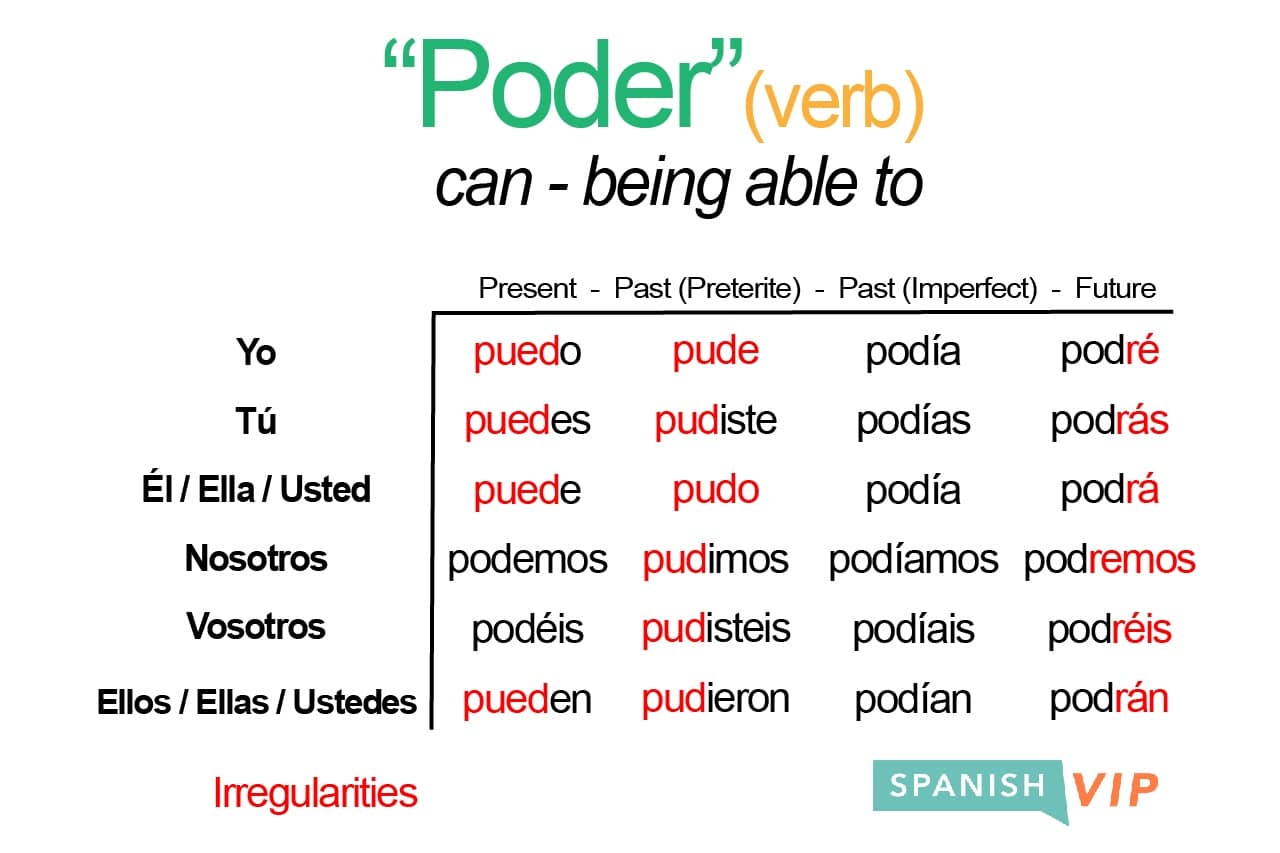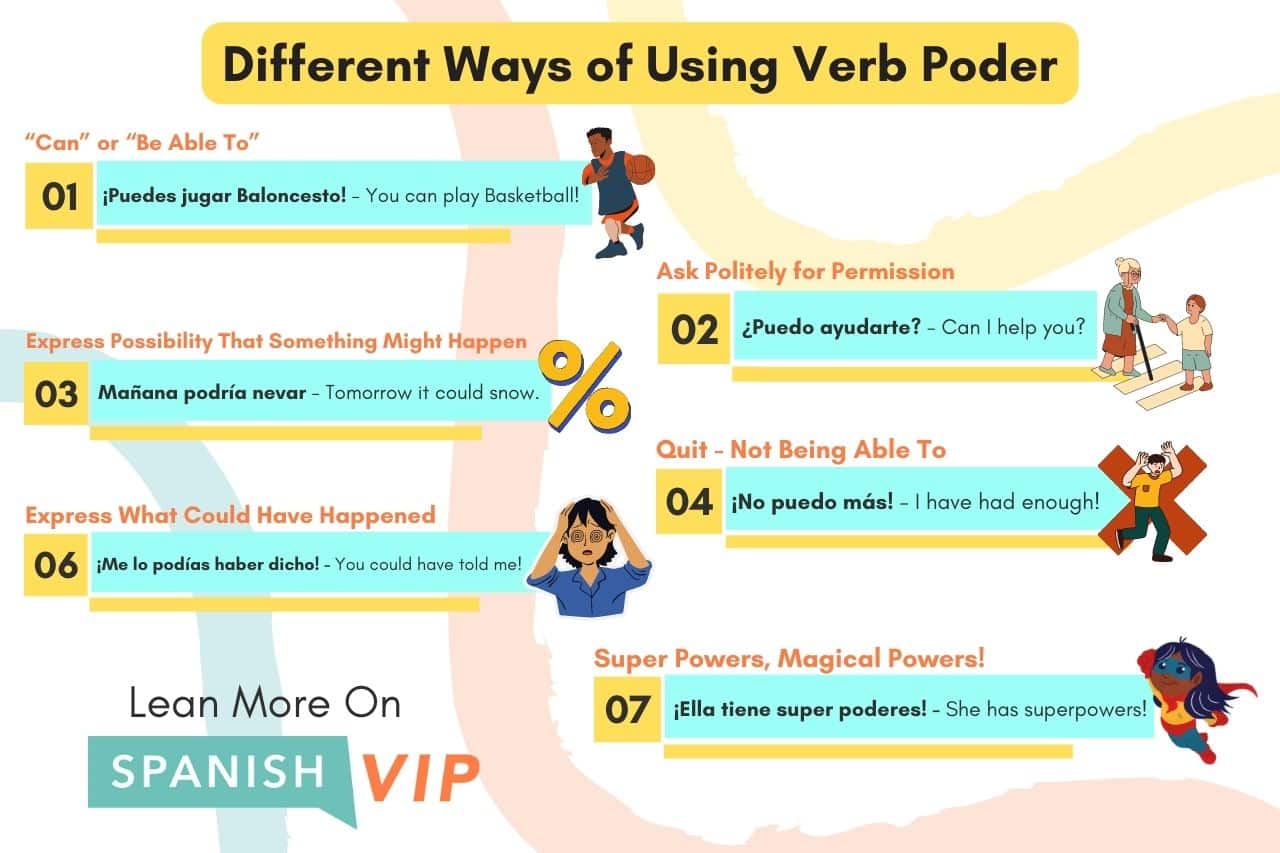
Poder Conjugation: Master The Verb can In Spanish With Confidence
DATE:
Ever wondered how to express what you can or can’t do in Spanish? It all comes down to one powerful verb: “poder.” This little word packs a punch, allowing you to talk about abilities, possibilities, and permissions. Whether you’re discussing your skills, asking for permission, or even making plans, “poder” is your go-to verb. But here’s the catch—it’s an irregular verb, meaning its conjugations can be a bit tricky.
“Poder” doesn’t follow the regular conjugation patterns, so mastering it might take a bit more practice. But don’t worry! The good news is that once you get the hang of it, you’ll find that it’s one of the most useful verbs in the Spanish language. Imagine being able to say, “I can do it” or “Can you help me?” with ease. That’s the power of “poder.” Let’s break it down and make sure you’re fully equipped to use this verb in any conversation. Ready to dive in? Let’s unlock the potential of “poder” together!

Meaning Of The Spanish Verb “Poder”
“Poder” is a Spanish verb that means “to be able to” or “to have the ability to.” It is a very common verb in Spanish and is used in a variety of contexts.
It is an irregular verb, meaning that it does not follow the regular conjugation patterns of Spanish verbs. In the present tense, the conjugation of “poder” is as follows:
- Yo puedo. (I can)
- Tú puedes. (You can)
- Él/Ella puede. (He/she can)
- Nosotros podemos. (We can)
- Vosotros podéis. (You all can)
- Ellos/Ellas pueden. (They can)
In other tenses and moods, the conjugation of “poder” changes slightly. For example, in the past tense (preterite), the conjugation is:
- Yo pude. (I was able)
- Tú pudiste. (You were able)
- Él/Ella pudo. (He/she was able)
- Nosotros pudimos. (We were able)
- Vosotros pudisteis. (You all were able)
- Ellos/Ellas pudieron. (They were able)
Spanish Verb Conjugation: Conjugations of the Irregular verb Poder
Indicative Conjugation of Poder
In Spanish, the indicative mood is used to express factual information, whether it’s a true action, event, or state that has happened or is happening in the present, past, future, or conditional.
It is one of three moods in Spanish grammar and is the most common way to convey information.
|
Subject |
Present |
Preterite |
Imperfect |
Future |
Conditional |
|---|---|---|---|---|---|
|
Yo |
puedo |
pude |
podía |
podré |
podría |
|
Tú |
puedes |
pudiste |
podías |
podrás |
podrías |
|
Él, Ella, Usted |
puede |
pudo |
podía |
podrá |
podría |
|
Nosotros |
podemos |
pudimos |
podíamos |
podremos |
podríamos |
|
Vosotras, Vosotros |
podéis |
pudisteis |
podíais |
podréis |
podríais |
|
Ellos, Ellas, Ustedes |
pueden |
pudieron |
podían |
podrán |
podrían |
Examples for each tense:
Present tense
“Yo puedo hablar español con fluidez.” – I can speak Spanish fluently.
Preterite tense
- ¿Pudiste terminar el trabajo a tiempo? – Were you able to finish the work on time?
Imperfect tense
- Ella podía bailar muy bien cuando era niña, pero ahora tiene problemas para seguir el ritmo. – She could dance very well when she was a child, but now she has trouble keeping the rhythm.
Future tense
- Podremos ir al cine después de terminar nuestros deberes. – We will be able to go to the movies after we finish our homework.
Conditional tense
- Ellos podrían ir a la playa si tuvieran tiempo libre. – They could go to the beach if they had free time.
Poder Conjugation: Compound Tenses of the Indicative Mood
Compound tenses are those that have the verb “have” as an auxiliary, and the past participle of the main verb (ado-ido-to-so-cho). The compound tenses are used to talk about past actions that are completed or that have an effect on the present.
|
Subject |
Present Perfect Tense |
Pluperfect Tense(Past Perfect) |
Future Perfect Tense |
Conditional Perfect Tense |
|---|---|---|---|---|
|
Yo |
he podido |
había podido |
habré podido |
habría podido |
|
Tú |
has podido |
habías podido |
habrás podido |
habrías podido |
|
Él, Ella, Usted |
ha podido |
había podido |
habrá podido |
habría podido |
|
Nosotros |
hemos podido |
habíamos podido |
habremos podido |
habríamos podido |
|
Vosotras / Vosotros |
habéis podido |
habíais podido |
habréis podido |
habríais podido |
|
Ellos, Ellas, Ustedes |
han podido |
habían podido |
habrán podido |
habrían podido |
Present perfect tense
The present perfect (el pretérito perfecto) is used to talk about past actions that have been completed and have an effect on the present.
- He podido resolver el problema gracias a tu ayuda. – I have been able to solve the problem thanks to your help.
Pluperfect tense (Spanish past perfect tense)
The Spanish past perfect (el pretérito pluscuamperfecto) is used to talk about past actions that were completed before another past action.
- Cuando llegué al teatro, la obra ya había empezado y no había podido entrar. – When I got to the theater, the play had already started and I hadn’t been able to get in.
Future Perfect tense
The future perfect (el futuro perfecto) is used to talk about future actions that will be completed before a specific time in the future.
- ¿Crees que él habrá podido terminar el trabajo a tiempo? – Do you think he will have been able to finish the work on time?
Conditional perfect tense
The conditional perfect tense (el condicional compuesto) is used to talk about past actions that could have taken place if a condition was met, but didn’t.
- Si hubiéramos sabido antes, habríamos podido prepararnos mejor. – If we had known earlier, we would have been able to prepare better.
Poder Conjugation: Subjunctive Mood
The subjunctive mood indicates subjectivity; the speaker is expressing their own perception of something. Subjunctive clauses almost always follow an expression or main clause that signals subjectivity.
|
Subject |
Present |
Imperfect 1 |
Imperfect 2 |
Future |
|---|---|---|---|---|
|
Yo |
pueda |
pudiera |
pudiese |
pudiere |
|
Tú |
puedas |
pudieras |
pudieses |
pudieres |
|
Él, Ella, Usted |
pueda |
pudiera |
pudiese |
pudiere |
|
Nosotros |
podamos |
pudiéramos |
pudiésemos |
pudiéremos |
|
Vosotras / Vosotros |
podáis |
pudierais |
pudieseis |
pudiereis |
|
Ellos, Ellas, Ustedes |
puedan |
pudieran |
pudiesen |
pudieren |
Examples for each tense:
Present Subjunctive
The present subjunctive is a grammatical mood used in Spanish to indicate various states of unreality such as doubt, possibility, necessity, or action that has not yet occurred.
One of the most common situations in which the present subjunctive is used is after certain conjunctions, such as “a menos que” (unless), “aunque” (although), “para que” (so that), “Ojalá” (I wish) and “sin que” (without) to express conditions or actions that are subject to the speaker’s wishes or opinions.
“A menos que puedas demostrarlo, no te creeré.” – Unless you can prove it, I won’t believe you.
Imperfect Subjunctive
Here are 2 examples of the Spanish imperfect subjunctive:
- Ojalá que pudieras ayudarme con esto. – I wish you could help me with this.
- Es importante que pudieses estar allí a las siete. – It is important that you could be there at seven.
Future Subjunctive
The Spanish future subjunctive tense is used to describe a hypothetical possibility or something that you wish or hope will happen in the future. This tense is not often used in everyday conversation in modern Spanish, but you may still encounter it in some older texts or legal documents.
- No sé si el pudiere venir. – I don’t know if he will be able to come.
Compound Subjunctive tenses of “Poder”
The compound tenses of the subjunctive are formed by combining the auxiliary verb “haber” (to have) with a past participle (a verb form that usually ends in “-ado” or “-ido”).
|
Subject |
Present Perfect Tense |
Pluperfect Subjunctive 1 |
Pluperfect Subjunctive 2 |
|---|---|---|---|
|
Yo |
haya podido |
Hubiera podido |
hubiese podido |
|
Tú |
hayas podido |
Hubieras podido |
hubieses podido |
|
Él, Ella, Usted |
haya podido |
Hubiera podido |
hubiese podido |
|
nosotros, nosotras |
hayamos podido |
Hubiéramos podido |
hubiésemos podido |
|
vosotros, vosotras |
hayáis podido |
Hubierais podido |
hubieseis podido |
|
Ellos, Ellas, Ustedes |
hayan podido |
Hubieran podido |
hubiesen podido |
Present Perfect Subjunctive
The present perfect subjunctive, also known as “el pretérito perfecto del subjuntivo”, is a grammatical tense used to express doubt or uncertainty about a past action that has been completed.
- No sé si habría podido hacerlo sin tu ayuda, ¡gracias! – I don’t know if I would have been able to do it without your help. Thank you!
Pluperfect Subjunctive 1
The past perfect subjunctive, also known as the “el pluscuamperfecto del subjuntivo“, is used to express doubt or uncertainty about a past action that occurred before another past action.
- Si hubiera estudiado más, hubiera podido aprobar el examen. – If I had studied more, I would have been able to pass the exam.
Pluperfect Subjunctive 2
The pluperfect subjunctive 2 works the same way as the first version and can be used interchangeably since it means the same.
- Si hubieses podido hablar español, podrías haber conseguido ese trabajo en Madrid. – If you had been able to speak Spanish, you could have gotten that job in Madrid.
Poder Conjugation in the Imperative Mood
The imperative mood is used to give orders, commands, or requests, and it does not have any compound tenses. In Spanish, the imperative mood is formed using the base form of the verb (also known as the infinitive form).
The conjugation of the imperative mood depends on the subject of the command. But, in this case, the imperative conjugation of the verb poder has some irregularities, so pay attention.
|
Subject |
Affirmative |
Negative |
|---|---|---|
|
Tú |
¡puede! |
¡no puedes! |
|
Usted |
¡pueda! |
¡no pueda! |
|
Nosotros |
¡podamos! |
¡no podamos! |
|
(Vosotros, Vosotras) |
¡poded! |
¡no podáis! |
|
Ustedes |
¡puedan! |
¡no puedan! |
Affirmative Imperative
- ¡Puede empezar cuando esté listo! – You can start when you’re ready!
Negative Imperative
- ¡No puedan entrar sin permiso! – They can’t enter without permission!
Different ways of using “Poder”
- Ability and Capability
This irregular verb is commonly used to express one’s ability or capability to complete a task. For example: “Yo puedo cocinar una cena deliciosa” (I can cook a delicious dinner) or “Ella puede tocar el piano muy bien” (She is able to play the piano very well).
- Requesting Permission
In certain situations, “poder” is used to politely ask for permission or express that someone has been granted the ability to do something. For example: “¿Puedo usar tu baño?” (May I use your bathroom?) or “No se puede fumar aquí” (Smoking is not allowed here).
- Possibility
When used in the third-person singular conjugation, followed by another infinitive verb, “poder” is used to express speculation or the possibility of something happening in the future. For example: “Mañana puede llover” (It may rain tomorrow) or “Puede que ganemos el partido” (We may win the game).
- Guessing
“Poder” can also be used to make guesses or express uncertainty about future events. For example: “Puede que sí, puede que no” (Perhaps yes, perhaps no).
- Frustration
In situations where one has reached their limit, “poder” can be used to express frustration. For example: “No puedo más con esta espera” (I can’t take this wait anymore) or “No puedo seguir, estoy harta de esta situación” (I can’t continue, I’m fed up with this situation).
- Power
When used as a noun, “poder” refers to power, whether it be actual political power or imagined abilities. For example: “El presidente tiene mucho poder” (The president has a lot of power) or “El mago tenía poderes mágicos” (The magician had magic powers).

With SpanishVIP tu puedes learn anything
Understanding this Spanish verb conjugation is an essential skill for anyone learning Spanish. Whether you’re using it to politely ask for something or to express doubt or possibility.
Being able to correctly conjugate “poder” will help you communicate more effectively in the Spanish language. With practice and dedication, you’ll be able to master the conjugation of this important verb and take your Spanish fluency to the next level.
Improve your Spanish proficiency by signing up for a class at SpanishVIP! Our experienced instructors will guide you little by little so you can master the “poder” conjugations and achieve your language goals.
Take advantage of our free trial class or our 7-day complimentary group class package. Let us help you on your journey to fluency!








